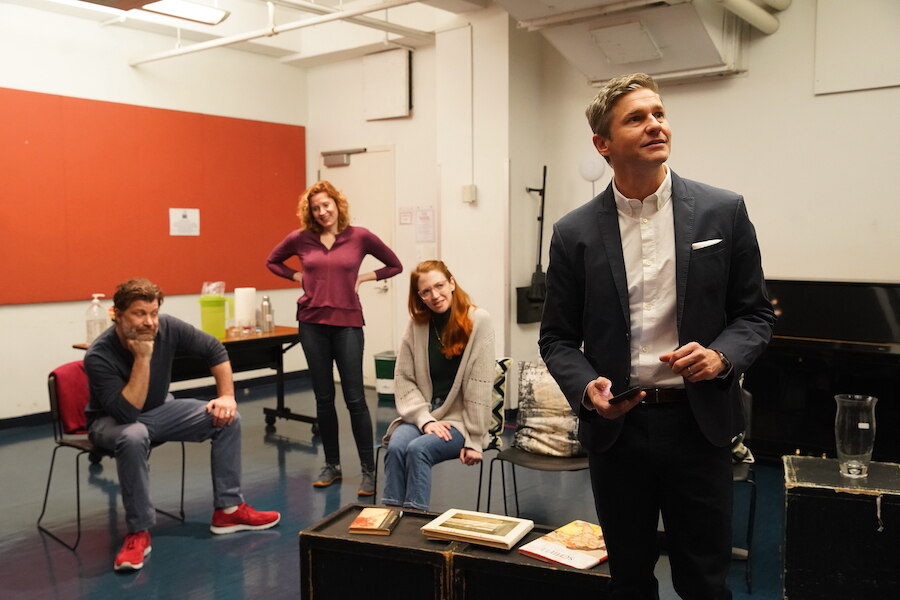This one’s crying over a toy, that one’s vomiting, and another one let the hamster out of its cage—and we haven’t even talked about the children yet. But the rules of the playground don’t apply inside a yuppie couple’s Cobble Hill brownstone.
When a preteen schoolyard scuffle prompts a meeting between two sets of parents, the pleasantries drop faster than a toddler can unlock a smartphone. One minute they’re eating clafouti and talking about tulips, and the next they’re calling someone’s son a “little bastard.” So it goes in God of Carnage, Yasmina Reza’s hit play, translated into English by Christopher Hampton, which took home the 2009 Tony Award for Best Play (it was also among the most-produced plays in the U.S. for some years after that and was the basis for the 2011 movie Carnage).
The nerves are just as raw and the topics just as timely in the debut Off-Broadway production, presented by Theater Breaking Through Barriers, April 18-May 20 at Theatre 5 on Theatre Row.
For more than 40 years, TBTB has been a professional Off-Broadway theatre organization based in New York City dedicated to advancing artists and developing audiences of people with disabilities. Originally known as Theater By The Blind, the company was renamed in 2008 to be more inclusive of all forms of disability (while keeping its four-letter acronym). By producing professional-caliber performances by disabled and nondisabled artists, TBTB seeks to dismantle the stigmas and stereotypes around disability and advocate for the full inclusion of people with disabilities in the arts and in society.
Last fall a group of artists from TBTB were able to collaborate with members of the Freedom Theatre at the Bird International Theatre Festival in Tottori, Japan. Now back in the boroughs with God of Carnage, TBTB is tackling issues that hit closer to home. As one line from the play posits, “What goes on in Cobble Hill Park reflects the values of Western society!”
“I think that being able to do a play that is really relevant and speaks to where we are in our times is very important,” said TBTB artistic director Nicholas Viselli, who is also directing the play, on a break from rehearsal earlier this month. “For a company that works primarily to advance performers with disabilities, I always feel for us that the work we do has to be relevant. It has to apply to telling bigger stories. If it’s just stories about disability, I feel that’s very good and important and it helps to educate, but it still keeps us in a small box. People tend to say, ‘Ah, that’s a company that works with disabled artists and they do work about disability,’ and it limits who you are. The goal here is for our company to normalize disability and to level the playing field. So it’s really not so much about disability as it is about the work and the art.”
God of Carnage, he said, is just the right project for the polarized politics of our present moment.
“We’re in a different climate now than we were in 2009,” he said. “People communicate differently.” He sees an opportunity for deeper reflection in the play’s complex, divisive characters, who are constantly finding fault in each other while unable to admit their own complicity. “Despite the facade,” he adds, “we’re all who we were as kids.”
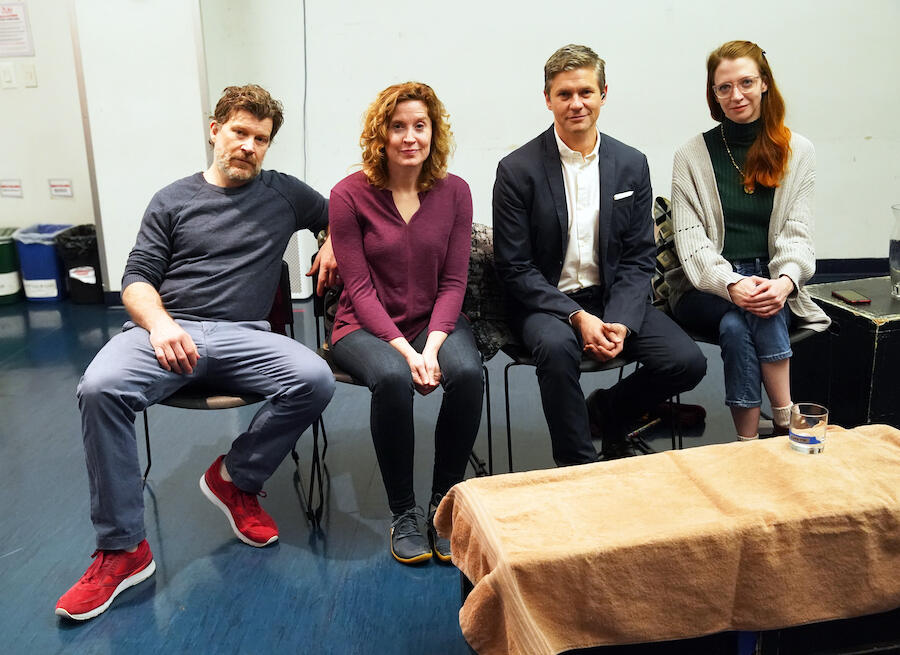
This production stars David Burtka as the workaholic Alan Raleigh, Carey Cox as the impulsive Annette Raleigh, Gabe Fazio as the exasperated Michael Novak, and Christiane Noll as the self-righteous Veronica Novak. Together with the crew, they form what Viselli calls a “dream team.”
“I think we’ve all been exceedingly well cast,” said Noll of the production’s particular synergy. “We all have our processes, and we’re all exceedingly patient with one another while we are stumbling about trying to find our way into these luxurious roles. It’s been pretty awesome.”
“We’re all bringing ourselves to these characters,” added Cox. “But we always go back to who these people remind us of. All of us know people, or I’ve worked with people who these characters remind us of. Also, especially in New York, I feel like a lot of us know these parents. That’s what makes it really seem more plausible now than ever.”
The cast explained that working on God of Carnage has made them more self-aware as people, and as parents or future parents.
“There’s always this notion that it’s difficult to play a character that is so close to you,” said Noll. “The hardest person to play is yourself, because you lack the self awareness to really realize that you’re playing yourself. But this is so well written—I know how close I am to Veronica. My family laughs at me, like, ‘This was a gift for you, wasn’t it?’ I am not Veronica, but it is glaring to me the parts of me that are like her.”
Actor David Burtka saw the play on Broadway back in 2009, but now, as a parent to 12-year-old twins, his connection to the material is “mind-blowingly” different.
“Reading it hit me in a completely different way,” said Burtka. “I think as a parent, you read this play so differently and you’re affected by it so much more. You’re affected in a much deeper way because of what these parents are going through. I can understand. I’ve seen these parents. Allen—I’ve seen him at school functions. I’ve seen these other parents that are these archetypes of people. I’m not that kind of parent, but it’s amazing that people raise their kids the way they do. It’s amazing that as a parent we can acknowledge that we are making mistakes.”
A parent’s desire to fight their child’s battles may be instinctual. Still, it’s important to remember, once sticks start swinging, that children are more than just reflections of their parents.
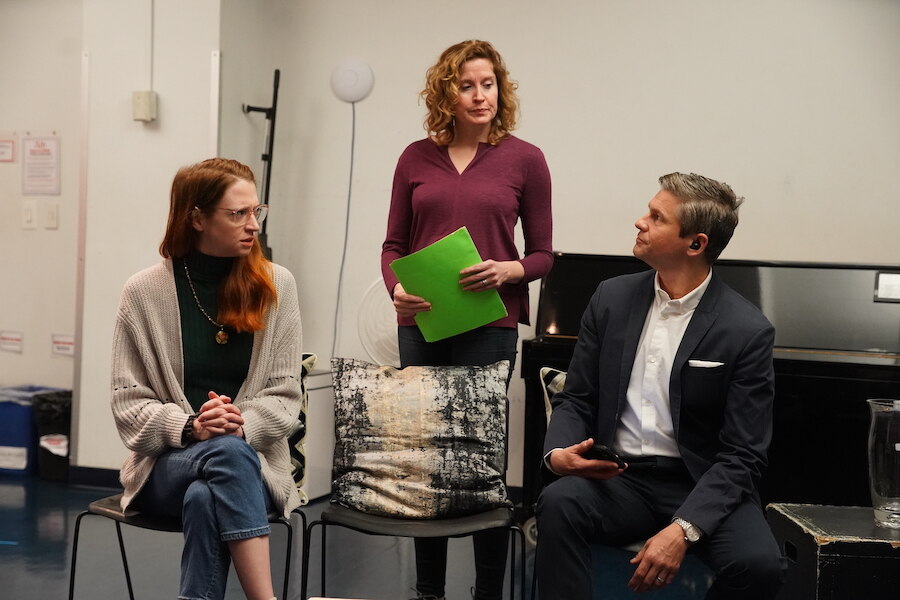
One area where Noll differs from her character is in terms of parenting style. “I am a parent who is okay with going back into the room and saying, ‘I didn’t handle that well, honey. Sorry, I’ll try to be better,’” she said. “Because I feel like that is modeling and giving permission for him to be able to make a mistake, but then to come back, apologize, and try to be better. So many of us don’t want to be wrong, don’t want to make mistakes, don’t want to let our children see us acting improperly. We don’t give kids enough credit. I don’t know what happens to adults that we forget.”
Though kids are often more resilient than their parents realize, the messages they internalize can have a lasting impact.
“It’s amazing, too, how we pass things down from generation to generation,” said Burtka. “The mistakes that we as a society keep making over and over. That’s why I feel like this play is stronger 14 years later. Because we didn’t learn what we were supposed to have learned in 2009. We’re still on this hamster wheel, and are we doing the right thing?”
This conversation seems all the more pertinent at a time when more prospective parents are questioning whether or not to have children. The play ponders whether married people are happier before they have kids. The cast explains that while it’s inevitable that having children changes relationships, there are people living fulfilling lives on both sides of the parenthood divide.
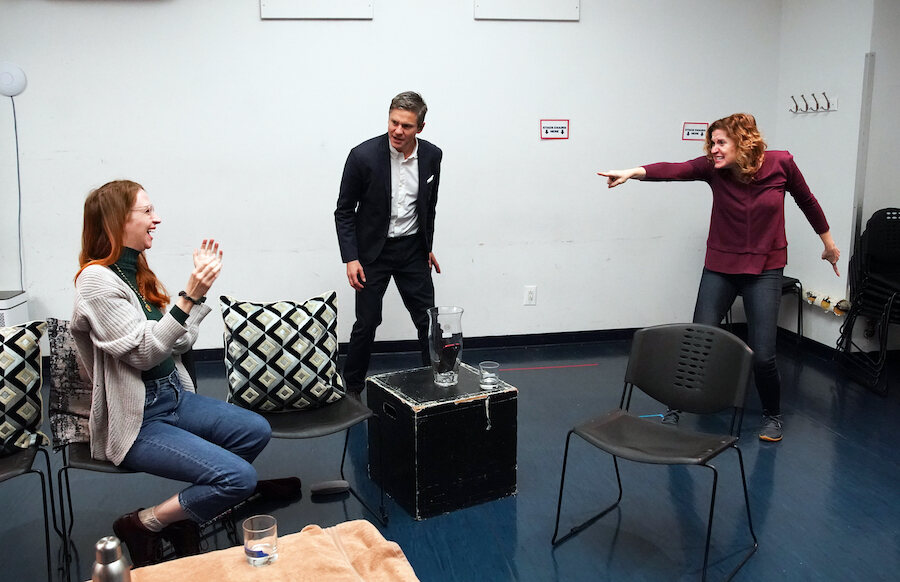
In practice, TBTB’s rehearsal process looks the same as any other theatre company. It shouldn’t be striking how comfortable everyone is with each other, but somehow the room feels different than most—lighter, almost.
“I think what matters, what we try to do from the beginning, and what I think every company needs to do,” Viselli said, “is try to establish open communication, open lines with everybody. Every artist has their needs. You have four actors here, all with very different processes. How do we all try to figure out how to coordinate what everyone needs? It’s just being able to be open about it and saying, ‘This is what I need.’ As a producer, I just want everyone to bring their A game, I want everyone to do their best work. So I have to make sure that everybody has what they need to do that, whether that artist is disabled or not. If an artist is disabled, it’s important that that’s communicated. I don’t want to play a guessing game or make assumptions. That’s when the problems start.”
Carey Cox came to work with TBTB after participating in one of their virtual Playmakers’ Intensives, held at the height of the pandemic. During these intensives, which now take place in a hybrid format, performers, directors, and writers are grouped together at random to devise short plays, giving them the opportunity to collaborate with artists they have never met before. For Cox, who sometimes uses mobility aids, the TBTB approach is different from what she has encountered in some other productions.
“This room feels very free,” said Cox. She appreciates “the idea that disability is not commented on…that we’re not necessarily worried about members of the audience getting hung up on the disability or needing a narrative. I’ve definitely been in rooms where I’ve been told if I’m using a wheelchair that I shouldn’t move my legs because we don’t want to confuse the audience and make them wonder why I can use my legs but I’m still using a wheelchair. I’ve been in shows where they’re worried about what I look like moving around, because I have a gait difference. So I’ve been kind of stuck in one part of the stage where it’s like: This is your little home, this is where you’re going to live, and everybody else is going to work around you. It’s just nice to be able to be authentic, just be myself and not have it be a big concern.”
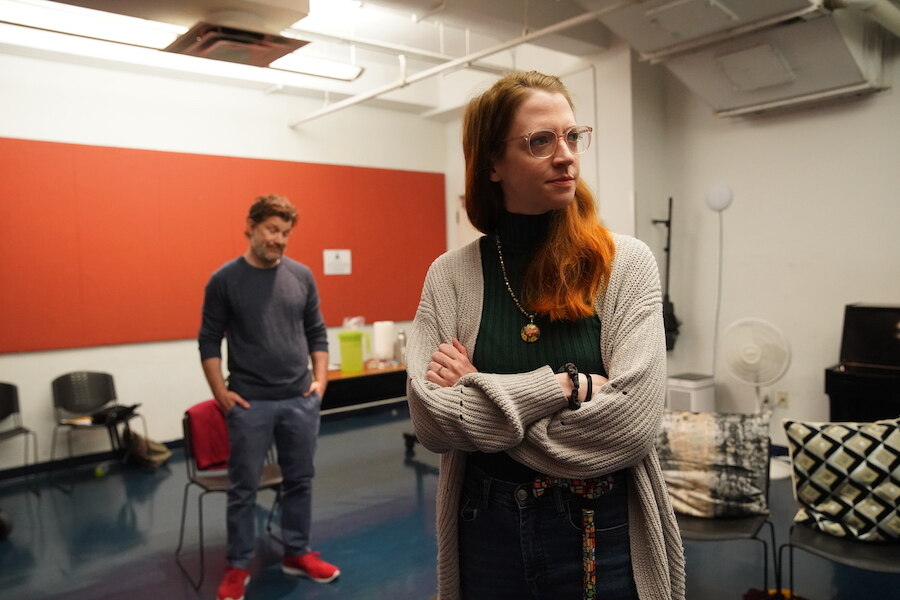
While Cox doesn’t feel trapped in a corner of the stage anymore, disabled performers are still limited by the audience’s attitudes toward difference. Cox recalled one critic who responded to her performance in Barefoot in the Park at Queens Theatre by saying that the inclusion of a disabled actor ruined the show for him, because he could not understand the complexities of their experiences and it took him completely out of the story.
“I love that we’re not worried about people like that,” said Cox. “We would rather see it as a learning opportunity for people who have that perspective, and we’re not catering to them.”
The “barriers” that TBTB aims to break through are not created by disabilities but by audiences. Indeed, there are plenty of people willing to donate to the organization, Viselli explained, who are simultaneously too intimidated to even set foot in the theatre. That’s why the company’s mission is to normalize disability by integrating disabled and non-disabled artists. At times this can be an uphill battle.
“In the arts, people want to see young, healthy, perfect people,” said Viselli. “That’s not the world, but that’s what people want to see. As a result, disability is stigmatized. If you have a visible disability or an invisible disability that is known, automatically people type you out. And that is a problem. Why can’t we just hire the artist? Don’t hire the disability, hire the artist. That is what matters to me.”
It’s a mission that is shared by the artists at Epic Players, Phamaly Theatre Co., and Theatre for All.
“We’re at a point right now where more disabled artists are being recognized than ever before,” Viselli continued. “We’re on that cusp where companies are really actively looking to hire disabled artists so that they can say they’re working with disabled artists. We’re not yet at a point where we can say, just hire the whole artist, whatever that artist brings to the table.”
Viselli acknowledged that TBTB has a lot riding on every production, as the company has a responsibility to change perceptions and build artistic credibility for the disability community. On God of Carnage, the creative team wanted to adhere closely to the source material, creating a very simple, nicely appointed living room space.
“I think the set also serves in a way as being kind of a box,” said Viselli. “These are people that, once they’re in it, they are kind of trapped, even though they try to leave. There’s an existentialism about it—the idea that they want to leave, but they never go.”
In true TBTB fashion, the production design incorporates access, including supertitles projected onto the back wall and audio descriptions recorded in the character’s own voices.
“Accessibility is not something that should be used as a tool; I think it needs to be part of the work,” said Viselli. “It needs to be woven into the production.”
Set designer Bert Scott and lighting and projection designer Samuel J. Biondolillo came together with this goal in mind. The effect, Viselli said, “almost presents a cartoonish element, because everyone’s talking and their words are over their heads. I don’t want to say that these characters are cartoons. That’s not the point. But it adds to the idea that this is not based in reality.”
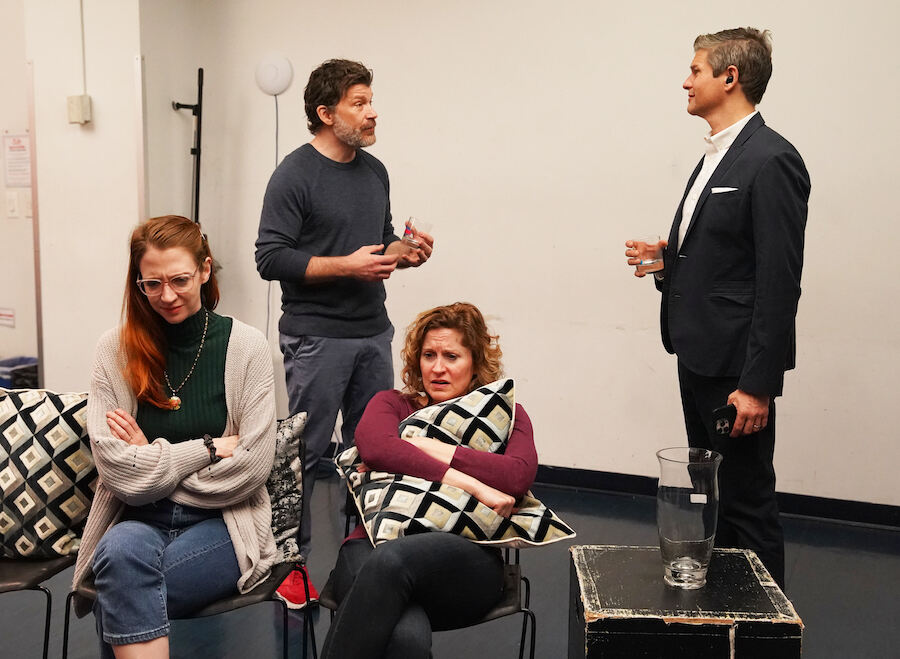
This production is David Burtka’s first time working with TBTB; as a non-disabled actor, he said he feels energized by both the mission and the work. “People are very naïve to the whole situation,” said Burtka. “It’s opened my eyes so much just by getting the word out about this mission, saying that people with disabilities are exactly the same as everybody else. It’s amazing to be a part of something to open people’s minds up to just that kernel, and then also this play that we’re doing seems equally as big and equally as awesome.”
The majority of people will experience some form of disability in their lifetime, and it is vital that members of the theatre field contribute to building an infrastructure that supports accessibility and inclusion.
“I think when we arrive at the point where people are being considered for roles that are outside their disability is when people will start to realize who would be the best actor for the job,” said Gabe Fazio, another TBTB first-timer. “We’re not there yet, until they can be considered with an equal opportunity. I feel like once we arrive there, we could create opportunities for people with disabilities to be able to be considered for a role that isn’t written with a disability. I feel like that would propel everyone into the stratosphere of equality.”
As companies like TBTB demonstrate, theatre is filled with possibilities for innovation.
“Theatre is life without limitations,” Viselli said. “You have the opportunity to create whatever you want.” If audiences can suspend their disbelief for magic spells and flying monkeys, why can’t casting directors? Artists are responsible for those they invite and exclude from the worlds they create.
“Everybody has something that someone else is going to have to hold a space for,” said Noll. “What makes any of us different in that regard?”
While the parents of Cobble Hill may not have solutions to all of the world’s problems, TBTB’s God of Carnage offers a useful model for a more human kind of theatre, and just possibly a better humankind.
Alexandra Pierson (she/her) is associate editor of American Theatre. apierson@tcg.org

